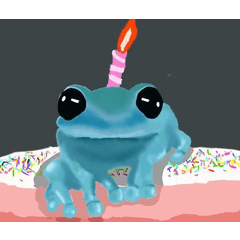Drawing and Understanding Eyes
HOW TO EYEBALL IT!
Let's make some eyes!
First up the basics.
Eye Anatomy
Let's take a look at the important parts of an eye.
1. Pupil
2. Iris
3. Sclera
4. Eye brows
5. Caruncula (this is not the tear duct!) the tear duct is basically a little hole on the end of your eyelids.) and is not usually visible, unless you pull down your eyelid.
6. Lids and Lashes
Caruncula vs. Tear Duct
1. tear ducts (hole like glands)
2. caruncula (The little pink bump)
Eye Shape
Think of the eye like a sphere with a doughnut sitting on it.
This'll help you when rendering an iris.
Rendering
1. Flat coloring
Hint: color the Sclera (the white part) a slightly darker shade than pure white. This'll make the highlights pop more.
2. Pick a light source and add some shading.
3. Eyes are wet, so puts some highlights in there!
Make sure to put your brightest colors on top of your darkest to make it pop.
Facial Anatomy
-General placement of the eyes on a human face in relation to nose, ears and mouth.
People's faces vary, but typically fall within these guidelines.
note: When making cartoon characters you don't need to follow this at all, put your noses, ears eyes, and mouths where ever you want!
Animal Eyes
We're all familiar with human eyes, but let's take a look at some other types.
There are a wide variety of different types of eyes throughout the animal kingdom.
Did you know goats and horses have hexagonal pupils, or that some aquatic animals have curved pupils?
Through evolutionary adaptations, nature has served up some fascinating and bizarre eyes.
If you're not already acquainted, You owe it to yourself to look up what a mantis shrimp is, right now!
I'm serious, go look it up, I'll wait...
Did you see that thing's punch, CRAZY!
Anyway... back to the eyes.
Emotions
Eyes have a wide range of emotions, more so in art, than in real life.
In real life eyes are limited by your eyelids, direction you're looking, and your eyebrows.
But when drawn, the sky's the limit!
An eye can be anything you want, take any shape, it can even leap out of your head!
Hint: Don't forget, eyes are just one part of the puzzle. Use the eyes and eyebrows as a base, then add face lines, a nose, and a mouth to really emphasize each emotion.
I suggest having a mirror in front of you at all times when drawing.
Bonus Chapter: Glasses & Light Refraction
I don't want to delve too deep into the refraction of light, because it should be it's own comprehensive tutorial.
But it's worth noting how it can effect the way you draw glasses on a character
.
I've drawn a few examples of how light can be refracted.
Notice how the face behind the glasses gets pushed back and dose't line up with the rest of the head's outline. Depending on the angle viewed and thickness of the lens, this could happen to an extensive degree, or not at all.


















Commentaire